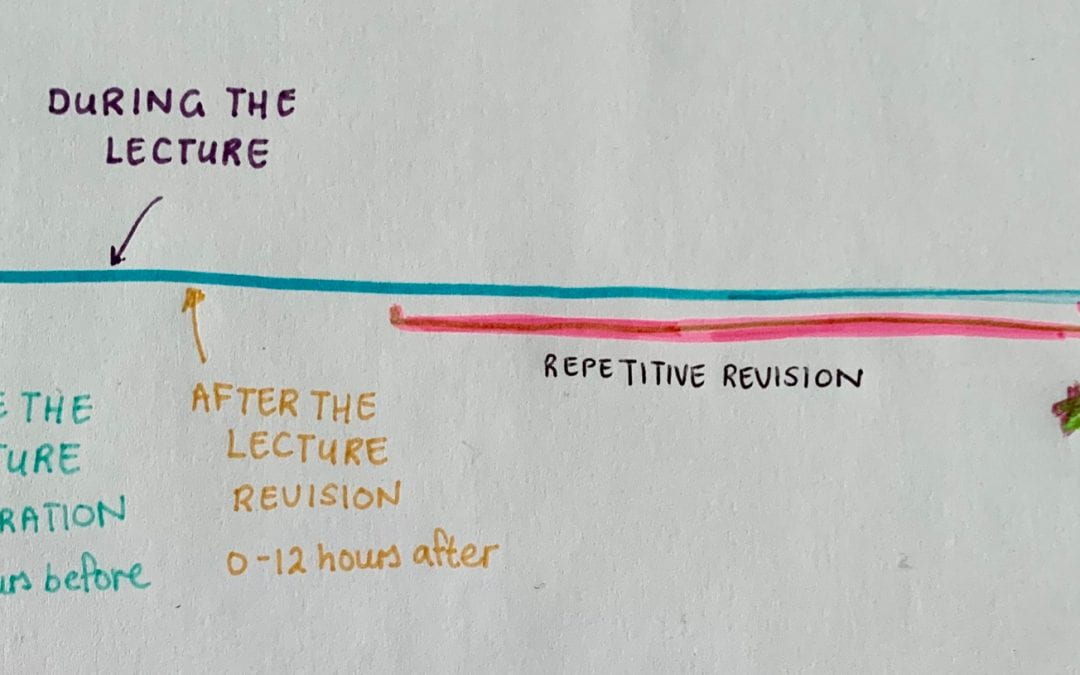Being a student feels like a full time job. In fact, the university recommends that for each paper, you should invest ten hours of work each week. This includes lectures, labs, tutorials, as well as your own personal study outside of class. Assuming you take four papers per semester, that means 40 hours a week of study is recommended!
How you study outside of teaching time is so important. Everyone’s study routine looks a little different, and that’s totally okay because we all learn in different ways. However regardless of this, it is still important to have your own plan for how you approach every lecture so that you can remain consistent throughout the semester and avoid additional stress!
Whatever your personalised routine looks like, developing a cycle for lecture study- a before, during, and after can really help you stay on track.
The night before
It is valuable to always do some form of preparation before you attend a lecture, even if it is only five minutes while you are drinking your morning coffee.
The main goal of preparing is not to teach yourself the entire lecture, but rather to introduce yourself to the material so that when you do attend the lecture it feels familiar, you can follow along and better understand what the lecturer is saying…and hopefully find it more enjoyable too!
Preparing for a lecture is actually pretty easy in university, because any relevant resources for the lecture are almost always posted on your course’s online page ahead of time.
For example, you could:
- Read the PowerPoint slides, the course guide, or the course textbook.
- As you do this, scribble down a few questions of what you do not understand, and some points about what you have learned.
- Look up the vocabulary you are unsure of, in case the lecturer does not define it
- Revise some relevant previous lecture content
During the lecture
Balance is key.
Writing down every single thing the lecturer says can be inefficient, not to mention almost impossible! On the other hand, I have found that sitting back and only listening is all too persuading for you to zone out.
As I listen to the lecturer speaking, instead of writing down information that is already in the PowerPoint or course guide, I highlight it and and annotate it with extra information. This helps me to actively think about what the lecturer is saying instead of mindlessly copying words.
You could bring along the questions you wrote down during your preparation, and try to answer them yourself as the lecturer speaks! I find this to be really satisfying.
Finally, make sure to listen out for special hints about the test or exam, as these honestly can make your day!
After the lecture
If you don’t have a class to rush off to after your lecture, I would recommend revising the content straight away, so you can begin to commit it to memory. That may sound a little extreme, but you will thank yourself when tests creep up and you realise you have already retained so much!
Write some summary notes, create some flashcards for important terms or definitions, and maybe even answer a couple of practice questions to see what you already understand.
I had a brilliant lecturer who introduced the class to a concept called the ‘forgetting curve’ in my very first university lecture. Put simply, the sooner you revise something, and the more times you revise it from that point, the more likely you are to retain it. It is quite scary seeing how quickly we can forget information, but it really shows why cramming just doesn’t work in university.
However, don’t worry if you can’t study it literally straight away! As long as you interact with that content at some point during the day, you won’t fall victim to the forgetting curve!
In the long term
Repetitive revision will give you results!
As the forgetting curve warns us, the more times we revise something, the better we retain it. This doesn’t necessarily mean you need to study the exact same thing in the exact same way like déjà vu though! Make sure you’re switching up your study methods to keep your brain on its toes, and prevent you from feeling bored. After all, learning is exciting and you should be able to enjoy what you are studying at university!
Finally, remember that you wouldn’t expect to pass your drivers test after practicing three times, or have ripped biceps after a few reps at the gym, so never feel discouraged if it takes you a long time to grapple difficult subjects. The sooner you start studying, the sooner you can identify your weaknesses, and the more time you have to master them.
Studying at university is a marathon, not a sprint, but if you take it step by step, develop a routine and remember revision involves a ‘before and after’, you are well on your way to having a smooth semester!

Wise words of wisdom that I needed to hear. Thank you!
It is very useful for me.